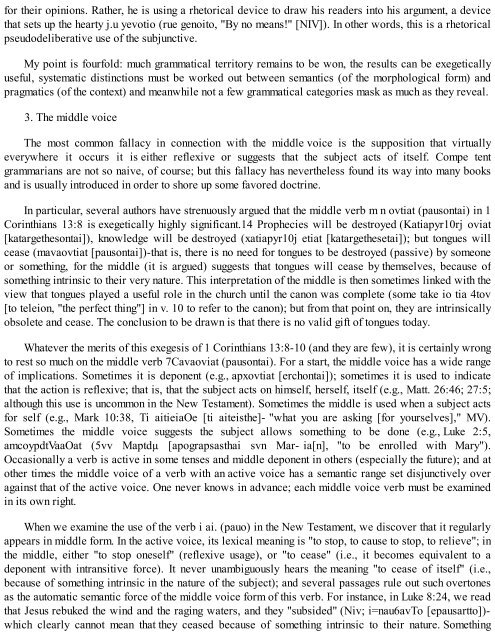Exegetical Fallacies - D. A. Carson
Exegetical Fallacies - D. A. Carson
Exegetical Fallacies - D. A. Carson
Create successful ePaper yourself
Turn your PDF publications into a flip-book with our unique Google optimized e-Paper software.
for their opinions. Rather, he is using a rhetorical device to draw his readers into his argument, a device<br />
that sets up the hearty j.u yevotio (rue genoito, "By no means!" [NIV]). In other words, this is a rhetorical<br />
pseudodeliberative use of the subjunctive.<br />
My point is fourfold: much grammatical territory remains to be won, the results can be exegetically<br />
useful, systematic distinctions must be worked out between semantics (of the morphological form) and<br />
pragmatics (of the context) and meanwhile not a few grammatical categories mask as much as they reveal.<br />
3. The middle voice<br />
The most common fallacy in connection with the middle voice is the supposition that virtually<br />
everywhere it occurs it is either reflexive or suggests that the subject acts of itself. Compe tent<br />
grammarians are not so naive, of course; but this fallacy has nevertheless found its way into many books<br />
and is usually introduced in order to shore up some favored doctrine.<br />
In particular, several authors have strenuously argued that the middle verb m n ovtiat (pausontai) in 1<br />
Corinthians 13:8 is exegetically highly significant.14 Prophecies will be destroyed (Katiapyr10rj oviat<br />
[katargethesontai]), knowledge will be destroyed (xatiapyr10j etiat [katargethesetai]); but tongues will<br />
cease (mavaovtiat [pausontai])-that is, there is no need for tongues to be destroyed (passive) by someone<br />
or something, for the middle (it is argued) suggests that tongues will cease by themselves, because of<br />
something intrinsic to their very nature. This interpretation of the middle is then sometimes linked with the<br />
view that tongues played a useful role in the church until the canon was complete (some take io tia 4tov<br />
[to teleion, "the perfect thing"] in v. 10 to refer to the canon); but from that point on, they are intrinsically<br />
obsolete and cease. The conclusion to be drawn is that there is no valid gift of tongues today.<br />
Whatever the merits of this exegesis of 1 Corinthians 13:8-10 (and they are few), it is certainly wrong<br />
to rest so much on the middle verb 7Cavaoviat (pausontai). For a start, the middle voice has a wide range<br />
of implications. Sometimes it is deponent (e.g., apxovtiat [erchontai]); sometimes it is used to indicate<br />
that the action is reflexive; that is, that the subject acts on himself, herself, itself (e.g., Matt. 26:46; 27:5;<br />
although this use is uncommon in the New Testament). Sometimes the middle is used when a subject acts<br />
for self (e.g., Mark 10:38, Ti aitieiaOe [ti aiteisthe]- "what you are asking [for yourselves]," MV).<br />
Sometimes the middle voice suggests the subject allows something to be done (e.g., Luke 2:5,<br />
amcoypdtVaaOat (5vv Maptdµ [apograpsasthai svn Mar- ia[n], "to be enrolled with Mary").<br />
Occasionally a verb is active in some tenses and middle deponent in others (especially the future); and at<br />
other times the middle voice of a verb with an active voice has a semantic range set disjunctively over<br />
against that of the active voice. One never knows in advance; each middle voice verb must be examined<br />
in its own right.<br />
When we examine the use of the verb i ai. (pauo) in the New Testament, we discover that it regularly<br />
appears in middle form. In the active voice, its lexical meaning is "to stop, to cause to stop, to relieve"; in<br />
the middle, either "to stop oneself" (reflexive usage), or "to cease" (i.e., it becomes equivalent to a<br />
deponent with intransitive force). It never unambiguously hears the meaning "to cease of itself" (i.e.,<br />
because of something intrinsic in the nature of the subject); and several passages rule out such overtones<br />
as the automatic semantic force of the middle voice form of this verb. For instance, in Luke 8:24, we read<br />
that Jesus rebuked the wind and the raging waters, and they "subsided" (Niv; i=nau6avTo [epausartto])-<br />
which clearly cannot mean that they ceased because of something intrinsic to their nature. Something



